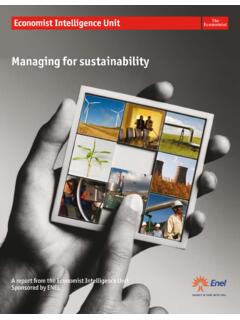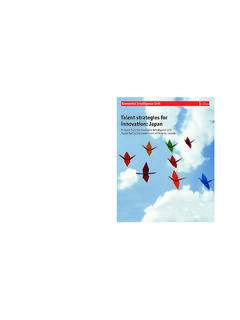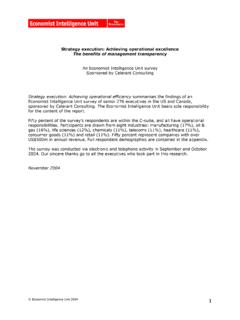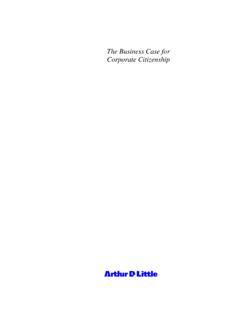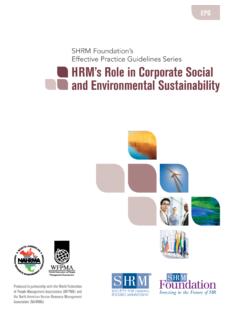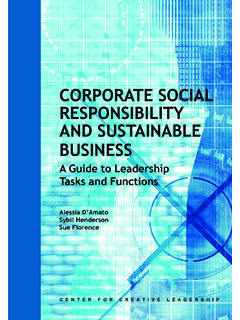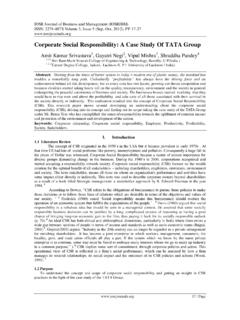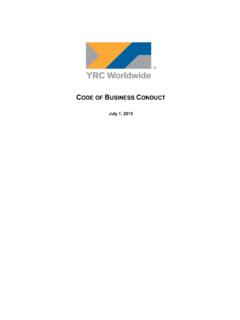Transcription of Corporate citizenship: Profi ting from a sustainable …
1 Corporate citizenship : Profi ting from a sustainable business A report from the Economist Intelligence UnitSponsored by Cisco, HP, Qualcomm, SASand Abbott, UTC Economist Intelligence Unit Limited 2008 Corporate citizenship :Profi ting from a sustainable business1 ContentsPreface 2 Executive summary 4 Introduction: the business case 5 From fringe to core 9 Doing good, American style 11 How to profi t from Corporate citizenship 15 Conclusion 22 Appendix: Survey results 24 Economist Intelligence Unit Limited 2008 Corporate citizenship :Profi ting from a sustainable business2 PrefaceCorporate citizenship : profi ting from a sustainable business is an Economist Intelligence Unit report. Lead sponsors are Cisco, HP, Qualcomm and SAS. The supporting sponsors are Abbott and UTC. The fi ndings and views expressed in this report do not necessarily refl ect the views of the sponsors. The Economist Intelligence Unit s editorial team executed the survey, conducted the interviews and wrote the report.
2 Kim Andreasson was the editor and project manager. Bob Johnstone was the author. Kevin Kal Kallaugher created the cover quantitative fi ndings presented in this report come from an online survey of 566 US-based executives 39% at vice-presidential level or above conducted by the Economist Intelligence Unit in September 2008. The survey asked respondents about their Corporate citizenship initiatives and their strategies for benefi ting from them. To supplement the quantitative survey results, we also conducted in-depth individual interviews with 16 senior executives and experts in Corporate thanks are due to all survey respondents and interviewees for their time and 2008 Economist Intelligence Unit Limited 2008 Corporate citizenship :Profi ting from a sustainable business3 List of intervieweesTralance Addy, chief executive offi cer (CEO), WaterHealth InternationalJohn Elkington, founder, SustainAbilityStuart Hart, director, Center for sustainable Global Enterprise, Cornell UniversityFred Krupp, president, Environmental Defense Stan Litow, vice-president, Corporate citizenship and Corporate affairs, IBMK eith Miller, manager, environmental health & safety, 3 MPaul Murray, director, environmental health and safety, Herman MillerJane Nelson, director, Corporate Social Responsibility Initiative, Harvard UniversityPat Penman, vice-president, global environmental and safety actions, SC JohnsonDawn Rittenhouse, director, sustainable development, DuPontJim Rogers, CEO, Duke EnergyPaul Tebo, president, The Tebo Group Mark Tercek, CEO, The Nature Conservancy Brian Walker, CEO, Herman Miller Mark Walker, director, global community affairs, Applied MaterialsPeter White, director, global sustainability, Procter & GambleAbout the surveyIn order to assess attitudes towards Corporate citizenship in America.
3 The Economist Intelligence Unit conducted an online survey of 566 US-based executives in September 2008. Thirty-nine percent of survey respondents describe themselves as board members, C-level executives or vice-presidents. About one-third (29%) work for publicly listed institutions. And 39% work for companies with global annual revenue exceeding US$500m. More than 17 different industries are represented in the survey sample, led by respondents from educational institutions (14%), information technology (IT) and technology (12%), consumer goods (9%), fi nancial services (8%) and professional services (8%). Respondents also come from a wide variety of functions, including general management (17%), IT (14%), customer service (13%), fi nance (9%), and research & development (8%). Overall, 19% of respondents who know the answer say that their company invests more than US$1m in Corporate citizenship initiatives annually. Despite the economic malaise in 2008, fi ve years from now 49% of those who say they know the answer say that they will spend more.
4 Economist Intelligence Unit Limited 2008 Corporate citizenship :Profi ting from a sustainable business4 Corporate citizenship is becoming increasingly important to business sustainability. It provides benefi ts that are both tangible such as reducing waste and increasing energy effi ciency and intangible such as improved employee productivity. This report is based on the hypothesis that Corporate citizenship can help to improve the bottom fi rms view Corporate citizenship as little more than public relations, but a minority are beginning to recognise its potential. Leading companies have moved from a do-no-harm, reactive mode to a more proactive approach. For more than a decade US fi rms like DuPont, 3M and SC Johnson have been showing the way, using Corporate citizenship as a source of competitive advantage. In recent years they have been joined by corporations like GE and strategy is characterised as much by a hunger for new business opportunities as by the urge to do the right thing.
5 However, beyond a small cohort of leading companies, most US fi rms have yet to maximise the business benefi ts of Corporate citizenship . They are seen as lagging behind their European counterparts. But they are catching up. There are many lessons to be learned from the leading companies. In particular, they build on four foundations: leadership at all levels, employee engagement, solid measurements and public-private partnerships:n To be successful, Corporate citizenship must be driven from the top. But leaders of this initiative are needed at all levels of the fi Signifi cant companies fi nd ways to channel the passion of their employees into Corporate citizenship activities. Such activities help fi rms to recruit better-quality workers and retain To convince senior executives that Corporate citizenship is effective, the fi nancial benefi t must be clear. Companies must set ambitious goals, along with ways of keeping track of progress towards them.
6 N Companies have discovered that fi nancial advantages can accrue from forming partnerships with non-traditional stakeholders. These include local, state and federal government, as well as activist groups and non-governmental on the lessons learned, we conclude by offering practical advice for fi rms wishing to use Corporate citizenship in order to improve their bottom line. Suggestions include making the business case, tying Corporate citizenship to core objectives, identifying the challenge and setting public summary Economist Intelligence Unit Limited 2008 Corporate citizenship :Profi ting from a sustainable business5 Introduction: the business caseCorporate citizenship can help to improve the bottom line. While the intangible benefi ts are often greater, there are exceptions. This report outlines the cases where it can be profi table, and the foundations needed on which to create an economic expansion, Corporate citizenship is an opportunity. Seventy-four percent of respondents to the survey conducted for this report say that Corporate citizenship can also help to increase profi ts at their company.
7 In an economic downturn, it can be a vital competitive advantage. Seventy-one percent of respondents say that business sustainability depends on effective Corporate citizenship . When times are bad, companies typically spend less, and an effective strategy can save a company money. According to the survey conducted for this report, cost-cutting was also the third most common motivation for Corporate citizenship . In many ways the business case for environmental sustainability is also stronger in the current economic downturn, says Peter White, director for global sustainability at Procter & Gamble (P&G), a Fortune 500 consumer goods company. Sustainability initiatives often lead to increases in the effi ciency with which materials and energy are used, reducing costs for both companies and consumers, he continues. Stan Litow, vice-president for Corporate citizenship and Corporate affairs at IBM, a technology and consulting company, agrees: If Corporate citizenship were a frill and had no clear benefi t it ought not survive in any economic climate, good or bad.
8 But, if it is viewed as something tied to business strategy with a real, measurable and clear return on investment established over time, then it s not viewed as something you can or should do less of in a time of economic crises. According to the survey conducted for this report, 19% of respondents who know the answer say that their company invests more than US$1m in Corporate citizenship initiatives annually. Despite the economic malaise in 2008, fi ve years from now 49% of those who say they know the answer say they will spend more. Among large companies (those with annual revenue of US$10bn or more) the equivalent fi gure is 67%.At furniture maker Herman Miller, investments in sustainability-related areas have resulted in a 32% annual rate of return, according to a recent case study by Forrester Research. The company has reduced landfi ll waste by 80%, hazardous waste by 91%, overall emissions by 87% and water usage by 67%, while doubling sales to more than US$2 billion in 2007.
9 It started as making sure there were no risks in producing our products, says Keith Miller, manager of health and environmental safety at 3M, a Minnesota-based manufacturer of adhesives and abrasives. Economist Intelligence Unit Limited 2008 Corporate citizenship :Profi ting from a sustainable business6 But more and more it s becoming looking at the opportunities, fi nding products that have some environmental or energy advantage over what s in the market today. And from a business and customer perspective, that s becoming very valuable. In the survey conducted for this report, US-based executives agree: when asked for their company s primary Corporate citizenship motivation, the top three answers all relate to the bottom line: revenue growth (16%), increasing profi t (16%) and cost savings (13%). Among the 68 chief executive offi cers (CEOs) in the survey, the sentiment is even stronger: one-quarter (25%) of them say that their primary motivation for Corporate citizenship is to increase profi t.
10 And CEOs interviewed for this report, like Jim Rogers of North Carolina-based energy company Duke Energy and Brian Walker of Herman Miller, agree without hesitation that companies can improve the bottom line through Corporate citizenship . Almost all the CEOs that I ve talked to have been stunned by how doing the right thing by the environment, they get huge business benefi ts, says Fred Krupp, president of Environmental Defense, a US-based advocacy group. He continues by outlining the intangible benefi ts: It galvanises employees to be happy about working for a company that cares about the environment. And it really improves the employee morale, and the ability to recruit and retain. Companies struggle with demonstrated return on investment, especially since many of the benefi ts of Corporate citizenship are indirect and intangible, and hence intrinsically hard to measure. Sentiment might be strong, but measures of success are hard to prove. For example, 78% of survey respondents agree that Corporate investment in education can improve their company s bottom line 20 years from An elusive defi nitionFor the purpose of this report, Corporate citizenship is defi ned as transcending philanthropy and compliance, and as addressing how companies manage their social and environmental impacts as well as their economic contribution.
